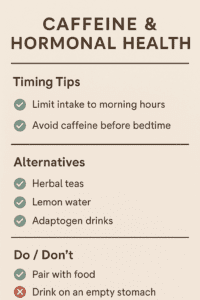
Balancing Caffeine and Hormonal Health
For many career women, caffeine feels like a trusted friend—the warm hug in your morning mug, the push that gets you through back-to-back meetings, the spark that keeps you sharp during afternoon deadlines. But during menopause, that friend can sometimes turn into a frenemy.
While caffeine can offer benefits, such as improved alertness, enhanced focus, and even mood support, it can also worsen symptoms like hot flashes, anxiety, insomnia, and heart palpitations. The key is not to cut it out completely (unless your doctor recommends it), but to balance your caffeine intake in a way that supports your hormonal health and overall well-being. Let’s explore how caffeine impacts hormones, what moderation looks like, and practical strategies to enjoy it without sabotaging your menopause journey:
How Caffeine Interacts with Hormones
Caffeine stimulates the central nervous system, giving you that instant boost of alertness. But it also affects key hormones that are already in flux during menopause:
- Cortisol (the stress hormone): Caffeine can raise cortisol levels, which might be helpful in small doses but problematic if you’re already dealing with high stress or adrenal fatigue.
- Estrogen: Some studies suggest caffeine may influence estrogen levels, particularly in women going through hormonal transitions. This can be more noticeable if you’re sensitive to hormone shifts.
- Melatonin: Caffeine can suppress melatonin production, making it harder to fall and stay asleep, a common struggle in menopause.
Because your body is already adjusting to fluctuating hormones, caffeine’s effects can feel amplified.
Signs You May Need to Adjust Your Caffeine Intake
Pay attention to how your body responds after coffee, tea, or energy drinks. You might need to adjust if you notice:
- Increased hot flashes or night sweats
- Faster heart rate or feelings of jitteriness
- Trouble falling asleep or staying asleep
- Midday crashes despite your morning coffee
- Heightened anxiety or irritability
Balancing Strategies for Menopausal Women
 1. Start with Timing, Not Elimination
1. Start with Timing, Not Elimination
If you love your morning coffee, keep it, but aim to stop caffeine intake by noon. This gives your body time to metabolize it before bedtime, reducing the risk of sleep disruptions (see chart).
2. Hydrate First Thing
Drink a glass of water before your first cup of coffee. This helps counter caffeine’s dehydrating effects and supports overall circulation and skin health.
3. Experiment with Lower-Caffeine Options
Consider switching to green tea, half-caf blends, or matcha (a finely ground powder made from green tea leaves). Green tea contains L-theanine, an amino acid that promotes calm focus, perfect for balancing caffeine’s stimulating effects.
4. Pair Caffeine with Food
Drinking coffee on an empty stomach can cause a sharper cortisol spike and acid production. Pair it with a protein-rich breakfast to stabilize blood sugar and soften caffeine’s impact.
5. Cycle Your Intake
If you rely heavily on caffeine, consider alternating full-caf days with low-caf or caffeine-free days. This prevents dependence and allows your adrenal system to rest.
6. Pay Attention to Hidden Sources
Chocolate, sodas, certain medications, and even decaf coffee can contribute to your daily caffeine total. Keep track so you’re not unintentionally overdoing it.
Menopause-Friendly Alternatives to Caffeine
If you want a mental boost without the hormonal downsides, try:
- Herbal Teas: Peppermint for refreshment, chamomile for calm, rooibos for antioxidants.
- Lemon Water: A morning ritual that wakes up digestion and hydrates your body.
- Adaptogen Drinks: Beverages with ashwagandha, maca, or rhodiola can help with stress resilience and energy balance.
- Protein Smoothies: They stabilize blood sugar and provide steady energy without spikes and crashes.
Making Peace with Your Cup
Caffeine doesn’t have to be the enemy, it just requires a more mindful relationship during menopause. Think of it like a high-powered colleague: great to have on your team, but not someone you want running the whole show.
Here’s a quick Caffeine & Hormonal Health Checklist to guide your choices:
- Am I sleeping well most nights?
- Do I feel calm after my caffeine, or anxious?
- Are my hot flashes more intense on high-caffeine days?
- Could I switch to tea or half-caf without losing focus?
If you answer “yes” to any of the problem signs, it’s time to adjust, not necessarily quit.
Final Thought:
Menopause is a season of recalibration, and caffeine can either work with you or against you. By tuning in to your body, timing your intake wisely, and exploring gentler alternatives, you can still savor your coffee moments without letting them tip your hormonal balance. Because your energy, focus, and calm aren’t just about what’s in your cup. They’re about how you honor your body’s needs at every stage of life.








